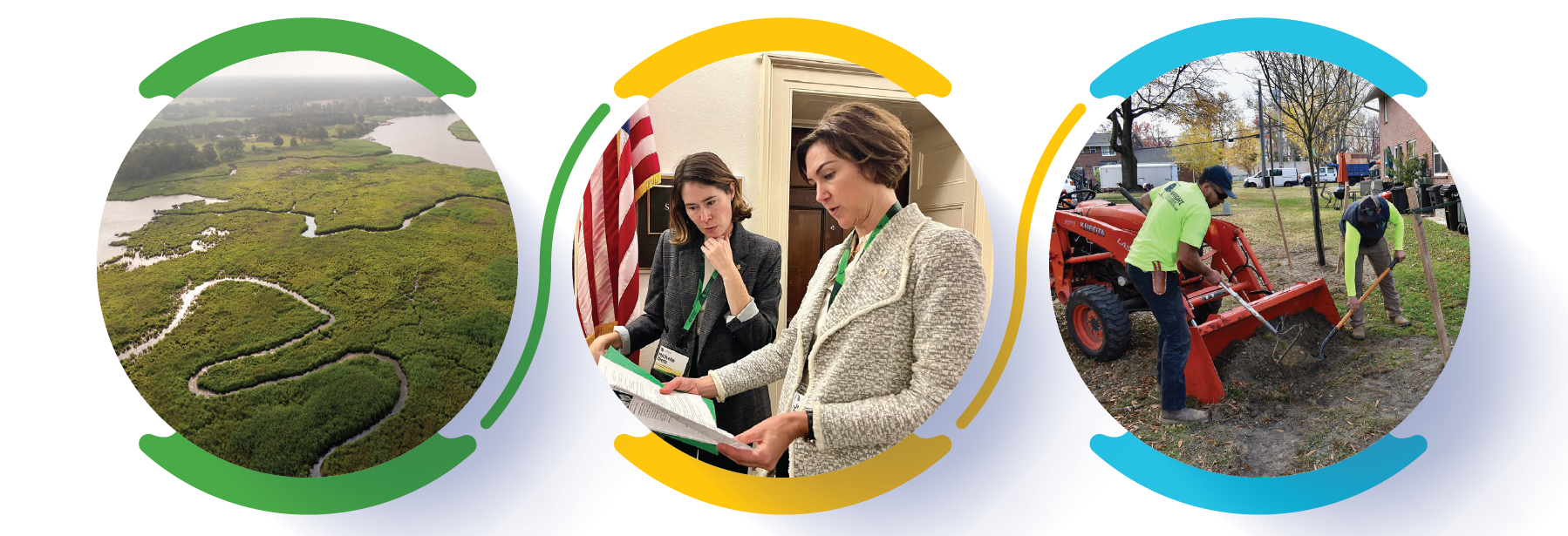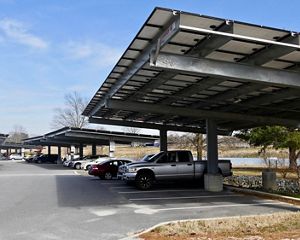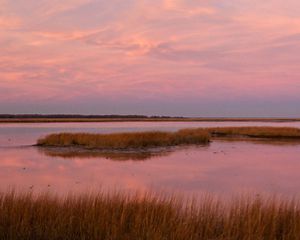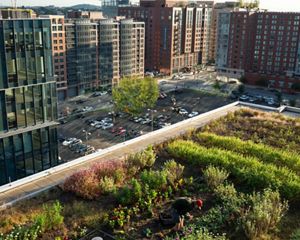
Policy and Government Relations
We’re working to advance legislation that will allow people and nature to thrive together.
The Nature Conservancy helps create, implement and defend policies related to conservation and climate action around the world. Our nonpartisan policy solutions are drawn from what we have learned from projects on the ground—guided by partners and grounded in science. This is our approach at all levels of government. The Maryland/DC chapter's Government Relations team works at the state level to advance forward-thinking policies on conservation and climate issues such as climate change mitigation, climate resilience and investments in nature.
How it works
To advance policies that favor conservation and climate issues, we follow a three-phased approach to shaping and implementing policy:
Step 1: Policy Development
As we’re a science-based organization, science informs TNC’s conservation and policy priorities and helps make the case for policy change. We are known for the relationships that we build with community partners, other NGOs, agency staff and elected officials. Through these coalitions, we help shape environmental policies that align with our local, national and global priorities.
Step 2: Advocacy
In addition to developing policy that supports our conservation goals, we also stand up and speak for it. Through meetings, broad communication and in-person testimony, our team works to make sure lawmakers understand the benefits provided by nature-positive legislation so that it is passed into law and protected once it’s established. Our local Government Relations team coordinates with our federal team to do this advocacy at both the state and federal level.
Step 3: Policy Implementation
It’s not enough for new policy and programs to be signed into law; they also need to be funded and implemented. TNC advocates for resource allocation for conservation programs through state and federal budgets, as well as new funding streams. We also work with our agency partners to implement conservation programs when we have a niche role to play or when we are able to act more nimbly and rapidly than our government partners.
Use Your Outside Voice
Do you want to be an advocate for Maryland’s environment but aren’t sure where to start? Find your representatives here and ask about what their plans are for 2026 to reduce emissions, build climate-resilient human and natural communities, and invest in nature!
Find Your Representative2026 Legislative Session Preview
The Maryland/DC chapter’s Government Relations team advances conservation and climate policies that invest in nature, reduce emissions and strengthen climate resilience. During the 2026 Maryland Legislative Session, TNC is working with environmental and climate partners to advocate for practical, science-based policy solutions that address current challenges while preparing Maryland for the future.
This session, we are focused on building durable support among lawmakers to protect the lands and waters that sustain Maryland’s communities and economy. At a time of fiscal constraint, this work is especially important. We are advocating to protect funding for core environmental programs that keep the state moving forward on its climate commitments, and we need your support.
Investing in Maryland’s Future: Lands, Water, Climate & Communities
Investments in nature deliver long-term economic, environmental and community benefits. TNC supports a balanced state budget that protects natural resources, advances climate mitigation and resilience, and ensures state agencies are equipped to deliver results. Even in difficult budget years, sustained investment in environmental programs helps avoid greater long-term costs.

Climate Mitigation
Climate mitigation remains a central focus of the 2026 legislative session. Key elements of the Climate Solutions Now Act and the state’s Pollution Reduction Plan still lack dedicated funding, and potential budget reductions could slow progress. TNC will support policies that advance Maryland toward a 60% reduction in greenhouse gas emissions by 2031 and net-zero emissions by 2045. Our approach emphasizes practical implementation, regional coordination and solutions that balance climate, community and conservation outcomes.
We will dive into policy addressing utility-scale renewable energy siting, transmission and distributed clean energy systems. We will bring TNC’s 3C framework into the legislation: Supporting clean energy deployment will deliver climate benefits, but it must align with benefits for communities, and the impact to conservation must be minimized.
Sustained investment in climate mitigation remains essential, even amid fiscal constraints. Proactive climate investments reduce disaster costs, protect public health and strengthen Maryland’s long-term economic resilience. TNC will support legislation that aims to identify and deploy funding sources to keep the state on track to meet its climate goals. We will continue engaging public and private sector partners to advance smart policy with inclusive approaches to climate investment, recognizing the role each sector plays in delivering durable solutions.

Climate Resilience and Adaptation
Nature-based solutions remain central to Maryland’s resilience strategy, particularly along coastlines and flood-prone areas. TNC supports the Department of Natural Resources’ (DNR) ADAPT legislation, which will pilot nature-based resilience projects, expand access to living shoreline financing, support local resilience coordination and improve statewide climate risk planning tools.
TNC will continue working with DNR, the Maryland Department of the Environment, the Chief Resilience Office and the Governor’s Office of Sustainability to advance a coordinated, statewide approach to climate adaptation.
Looking Ahead
TNC enters the 2026 legislative session focused on protecting core environmental investments, advancing climate solutions and ensuring that nature remains central to Maryland’s policy decisions. With continued engagement from partners and supporters, we can help secure a more resilient future for communities across the state.










